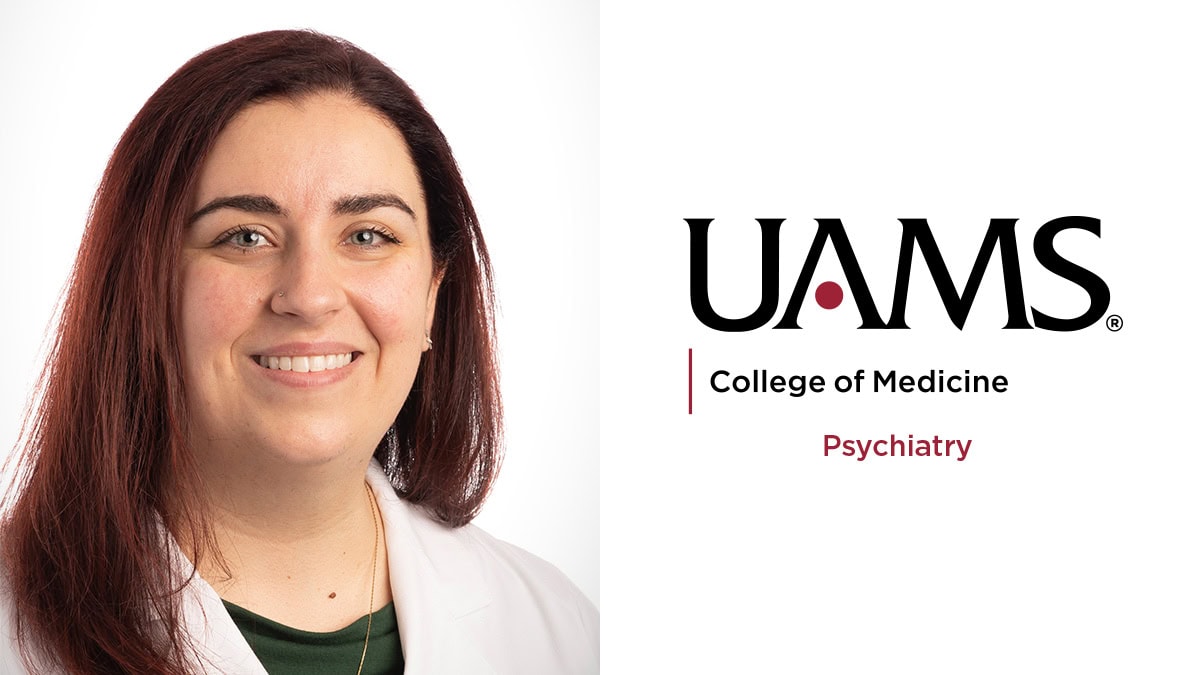View Larger Image

Melissa Zielinski, Ph.D.
UAMS Researcher Receives $3.3 Million Grant to Study PTSD Therapies in Prisons
| LITTLE ROCK — A University of Arkansas for Medical Sciences (UAMS) researcher has been awarded a grant worth $3.3 million from the National Institute on Drug Abuse (NIDA) to study the effectiveness of two therapeutic options in treating post-traumatic stress disorder (PTSD) in prison populations.
Melissa Zielinski, Ph.D., director of the Health and the Legal System (HEALS) Lab, is the principal investigator in a five-year study on the treatment of incarcerated adults with PTSD and substance use disorder using cognitive processing therapy (CPT). CPT is a specific type of cognitive behavioral therapy that is effective in reducing symptoms of PTSD that have developed after experiencing a variety of traumatic events including child abuse, combat, rape and natural disasters.
Zielinski expects that providing therapy for PTSD while people are in prison will help them have better outcomes after release, especially those that relate to substance misuse.
Roughly 5.5 million adults in the United States are either incarcerated or under correctional supervision. Approximately 85% of those individuals have an active substance use disorder or were incarcerated for a drug-related crime.
PTSD and substance use disorders increase the risk of those formerly incarcerated being arrested repeatedly, according to Zielinski. Despite this fact, few prisons in the U.S. provide PTSD therapy for persons in custody.
In the first of its kind national study, Zielinski’s team will test the effectiveness of CPT versus trauma-focused self-help and will study the implementation and costs of both interventions and the associated implementation strategies within 10 prisons in five states.
“We’ve known for decades that people who become incarcerated have almost all experienced repeated trauma exposure, and that a much greater percentage of this population have PTSD than we see in the general community,” said Zielinski. “But we haven’t yet done is taken that knowledge and systematically studied our evidence-based therapies for PTSD in prisons. This study will look at one of the most effective and established therapies for PTSD in prisons with the goal of building knowledge on how to implement it and on its financial costs with the hope that having this information could lead to uptake by other prisons in the future.”
The study will enroll over 600 incarcerated adults, male and female, and about 100 prison staff members.
Zielinski has spent the last five years researching CPT and its value to those with PTSD and substance use disorders in two correction centers in Arkansas. She sees this new multistate study as a way to identify new strategies for helping to break longstanding cycles of trauma, addiction and incarceration that characterize the nation’s prisons more broadly.
“When I talk to people who work inside prisons, there is almost always immediate buy-in about the role that trauma exposure and PTSD play in people coming to prison and struggling to succeed post-release,” Zielinski said. “They see it every day. This study is an opportunity to build knowledge on therapy with a real potential to disrupt that cycle, improving the health of people in prison, their families and the community.”
UAMS is the state’s only health sciences university, with colleges of Medicine, Nursing, Pharmacy, Health Professions and Public Health; a graduate school; a hospital; a main campus in Little Rock; a Northwest Arkansas regional campus in Fayetteville; a statewide network of regional campuses; and eight institutes: the Winthrop P. Rockefeller Cancer Institute, Jackson T. Stephens Spine & Neurosciences Institute, Harvey & Bernice Jones Eye Institute, Psychiatric Research Institute, Donald W. Reynolds Institute on Aging, Translational Research Institute, Institute for Digital Health & Innovation and the Institute for Community Health Innovation. UAMS includes UAMS Health, a statewide health system that encompasses all of UAMS’ clinical enterprise. UAMS is the only adult Level 1 trauma center in the state. UAMS has 3,485 students, 915 medical residents and fellows, and seven dental residents. It is the state’s largest public employer with more than 11,000 employees, including 1,200 physicians who provide care to patients at UAMS, its regional campuses, Arkansas Children’s, the VA Medical Center and Baptist Health. Visit www.uams.edu or uamshealth.com. Find us on Facebook, X (formerly Twitter), YouTube or Instagram.###